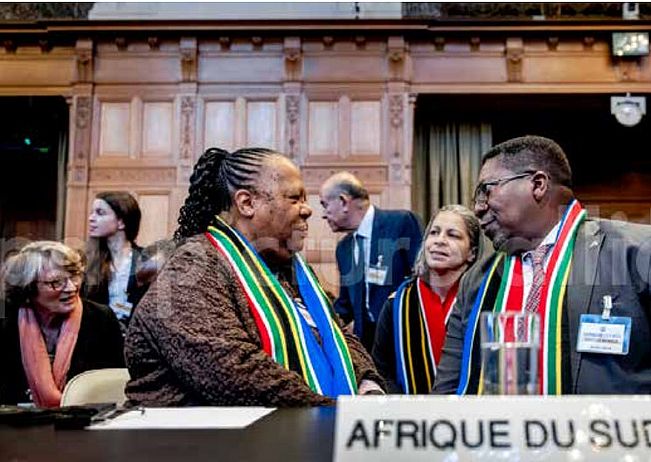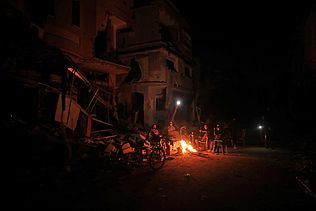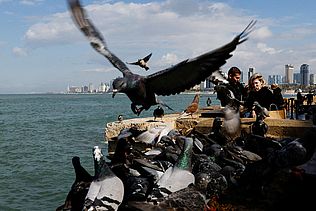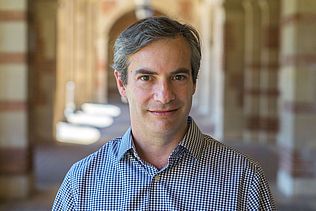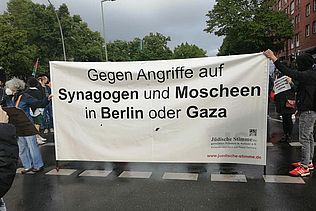It is not only a moving moment in The Hague when the South African delegation enters the International Court of Justice. Throughout South Africa, the hearings are being followed live and public support is being demonstrated. "I am proud to be South African and a member of the legal community that includes the brilliant minds that make up South Africa's legal team," says Jewish lawyer Caitlin Le Roith at a solidarity meeting. "Our history and shared experiences as South Africans, as well as the shared experiences of the Jewish people, make the South African application particularly meaningful for someone like me."
50 years of human rights struggles
At the end of 2023, South Africa applied to the International Court of Justice (ICJ) to open genocide proceedings and initiated an injunctive action to put a stop to the Israeli attacks on Gaza and to force aid to be provided to the civilian population. The hearing took place in The Hague on 11 January, with the nine-strong South African delegation presenting the grounds and arguments for their application. Its members are recognised human rights activists who enjoy the utmost respect in South Africa because they have never bowed to political pressure, but have always remained committed to the democratic constitution. The composition of the delegation epitomised 50 years of human rights struggles in South Africa.
There was John Dugard, for instance, the 87-year-old head of the South African legal team. He is an expert on UN international law and has himself served as an ad hoc judge at the ICJ. In 1978, he founded the Centre for Applied Legal Studies (CALS) in Johannesburg, one of the first organisations to defend the rights of black South Africans during the darkest days of apartheid. To this day, the organisation is regarded as an incorruptible defender of human rights and their enforcement in South Africa – even going against the ANC government if need be. There was the lawyer Adila Hassim, who opened the South African argument at the ICJ with the words: "Genocides are never announced in advance, but this court has received evidence in the last 13 weeks that shows a systematic pattern." Hassim has long battled for socio-economic rights in South Africa and at the height of the AIDS crisis fought for access to anti-retroviral drugs. And there was Tembeka Ngcukaitoibi. He substantiated the accusation of murderous intent to expel people from Gaza citing statements made by Israeli military and politicians. He is a leading constitutional lawyer as well as human rights lawyer at the Legal Resources Centre and led central corruption trials against former President Jacob Zuma and the current ANC government.
The right to rights
It is no coincidence that these lawyers are representing South Africa in The Hague. Nor is it any coincidence that it was South Africa that filed the application against Israel before the ICJ. The first reasons as to why the events in Gaza are receiving special attention in South Africa are probably rooted in the memory of the strained military and economic relations between Israel and apartheid South Africa; or the still close relationship between the ANC and the PLO; or the fact that Nelson Mandela, Oliver Tambo and many other legendary militants in the struggle against apartheid were all lawyers. Because the apartheid state claimed to be a constitutional state, and because the apartheid system was enshrined in more than a thousand pieces of legislation, lawyers were often at the forefront of the resistance. Two motives were at the heart of it: all people have the right to have rights. And this right applies equally to everyone, even the former oppressors. This conviction helped shape South Africa's democratic constitution and the political transition, which was not marred by victor's justice or an expulsion of whites.
Part of South Africa's very own tradition is also the fact that a large number of white supporters of the anti-apartheid struggle were Jewish, although Jews were and still are a small minority among South Africa's whites. Many Jewish activists came from families who had survived the Holocaust, most of them were non-Zionist and open to Palestinian perspectives. This has often exposed them to attacks from the other part of the Jewish community closely aligned with Israel, however.
Despite the abolition of apartheid in 1994, political and economic realities have fallen far short of the ideal as laid down in the democratic constitution. This is why legal battles have been and continue to occupy centre stage in the defence of social and political rights in South Africa over the past 30 years. At the same time, and increasingly so, this practice of defending the constitution and international legal instruments in democratic South Africa is coming under pressure: accusations are repeatedly levelled that they are a product of "Western" and "white" legal traditions. Added to this is a call for "African decolonial legal systems" – even if this often serves to conceal the vested interests of certain circles of the new elite and currents of ethnic nationalism. So far, it has been possible to rebuff these demands as identitarian and patriarchal in nature. Instead of watering down the constitution, human rights lawyers are calling for it to be spelled out in clear terms and expanded. There have also been disputes in South Africa over universal norms and international conventions that have called for diplomatic skill and finesse: when Western countries demanded South Africa hand Putin over to the International Criminal Court in the run-up to the BRICS meeting held in South Africa in August 2023, there was pressure on the country to withdraw from the Criminal Court. South Africa's government refused to do either, and arranged to have Putin not attend the meeting in person.
Beyond the dichotomy
The Hamas massacre and Israel's subsequent war against Gaza have deepened a division in the world that is above all polarising the discourse: On the side of Israel is the "West", above all the USA and Germany, with the "Global South" taking the side of the Palestinians. South Africa breaks through this dichotomy. The country has not always located itself between the West and the Global South. It is also characterised and permeated by many contradictions. Apartheid is symbolic of the double standards, ethical demands and abysses characterising the West. It was introduced in 1948, the same year in which the United Nations adopted the "Universal Declaration of Human Rights". The condemnation of apartheid by the United Nations as a "crime against humanity" then also became a central element in the fight against apartheid, which 50 years ago became a symbol of the struggles of the Global South.
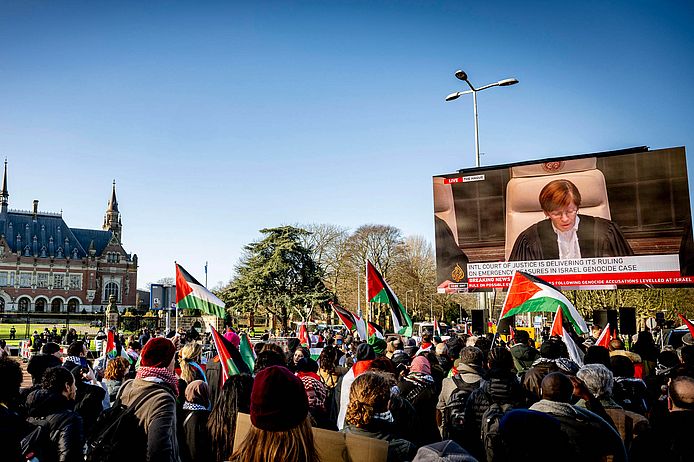
This "South African universalism" is being resurrected these days. South Africa has shown considerable great pride in the lawyers who, with the help of the ICJ, sought to put a stop to the military operation in Gaza and ease access to humanitarian aid. "Black people who survived apartheid became judges and lawyers and are now defending Palestinians against the country that supplied South Africa with weapons during apartheid," is how one social media commentator put it. This also aptly sums up the gist of the "never again" frame of mind imbuing and reflecting the spirit of the South African Constitution, but also South Africans' self-understanding in actual practice: it applies to all crimes against humanity. "As a child of apartheid, I have always tried to live my 'never again'," wrote Ferial Haffajee, an important public voice in South Africa in the context of the hearing. "One of the ways is to learn how crimes against humanity, war crimes and genocides begin. This knowledge allows you to do something about it and be part of the 'never again' army." And, she posits: "Why did humanity create a Genocide Convention in 1948 (in response to the Holocaust) if not to learn from its genesis?"
Objection from Namibia
Germany seems to see things differently. Just a few hours after the South African presentation, the German government declared that South Africa's accusations were "void of any foundation". The announcement that Germany would stand by Israel as a third party was justified by the fact that the German government "sees itself as particularly committed to the Convention against Genocide in view of Germany's history and the crime against humanity of the Shoah".
This attitude and reference to German history also provoked immediate outrage in South Africa's neighbouring country. The President of Namibia put his finger on Germany's inability to learn its lessons from its cruel history when it comes to Namibia: "Germany committed the first genocide of the 20th century on Namibian soil between 1904 and 1908. The German government has still not fully recognised and compensated for this genocide [perpetrated on the Ovaherero and Nama]." Sima Luipert from the Nama Traditional Leaders Association (NTLA) recalled that it was not until 2023 that ten UN Special Rapporteurs called upon Germany to legally recognise the first of the German genocides as such and to draw consequences from it. Germany refused, arguing that it was only a genocide from a present-day perspective, and merely offered development aid.
The German image of the German nation as serving a role model in coming to terms with its history(ies) of violence is not only being called into question by the frightening development of law within Germany, with anti-Semitism and racism on the rise, the roots of which are being denied and ignored, but also by criticism coming from Namibia as well as South Africa's foray making it a role model in international law. Instead of taking South Africa's step seriously and respecting the court proceedings, the German model of learning from history is serving to weaken international law and its institutions. South Africa's expedition to The Hague, on the other hand, teaches us what a universally conceived "never again" can truly mean.

